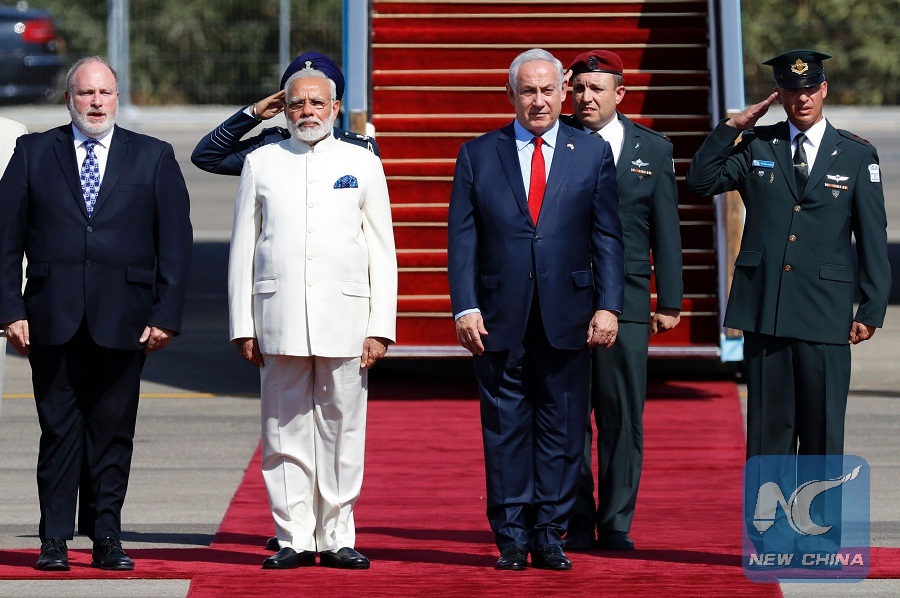India needs Israel more
- By Sumantra Maitra
 0 Comment(s)
0 Comment(s) Print
Print E-mail China.org.cn, January 20, 2018
E-mail China.org.cn, January 20, 2018
Israeli Prime Minister Benjamin Netanyahu and his Indian counterpart Narendra Modi signed a series of agreements, during Netanyahu's visit to India, the first in fifteen years, aimed at deepening cooperation in the areas of energy, the film industry, aviation, cyber and investment.

These agreements come as India is starting to plan a free trade pact with Israel, and Indian energy companies are looking to explore oil and gas in the Mediterranean. The welcoming of Netanyahu to India signifies a long term strategic change in culture in India. India and Israel started to develop strategic ties ever since the war on terror started, which only increased during the ghastly 2008 Mumbai terror attacks. And then Narendra Modi, himself a right-wing nationalist, went to visit Israel to solidify the alignment.
"This is the dawn of a new era in the great friendship between India and Israel that began with Prime Minister Modi's historic visit to Israel, which created tremendous enthusiasm. It continues with my visit here, which I must say is deeply moving for my wife and me, and for the entire people of Israel. And I think it heralds a flourishing of our partnership to bring prosperity and peace and progress for both our people," Netanyahu was quoted as saying. He brings with him, the little kid, who was the only survivor in the horrific attack in Mumbai, who was saved by her Christian nanny, who is considered a heroine in Israel.
The ties between India and Israel are complicated. Indian academia remains deeply anti-Israel, given India's post-colonial role. India consistently supported the Palestinian cause, and in later years a two-state solution, which is essentially dead after Donald Trump recognized Jerusalem as Israel's capital. Netanyahu said as much, during his visit. He said that Israel was disappointed that India supported the UN motion against Jerusalem, but also added that one vote isn't a sign of the trends in Indo-Israeli ties.
Netanyahu also said two more significant things. First he mentioned that India is a world power, when asked about the presence of the Indian navy in the Mediterranean. He also said, and this was missed by the majority of the news reports, but is immensely significant, that Israel would try and mediate if needed, between China and India, should there be any dispute, and should it be required.
While, it possibly shall not be required, as India and China both prefer bilateral solutions to any problem, it is a remarkable gesture, as Israel shares good offices with China. And finally, he said that Israel will help in technological advancement in India. Israel is one of the most tech advanced nations in the world, and Israeli tech might help India's nascent modern armament industry, as well as its farming sector, particularly with India's huge and growing population.
It's important to remember a few things. First of all, India's relationship with Israel is purely tactical. India, given its post-colonial history, is loath to fall into any alliance. That will be evident, when India tries its balancing act with Israel. While there are massive shared aligned interests, in two significant sectors, Israeli and Indian interests differ.
First, the issue of Palestine. Second, an even bigger headache, in Iran. India and Iran share historic ties and India has always relied on Iran as a counterbalance to Sunni Jihadism in Afghanistan and Pakistan. India is also developing ports in Iran as a counterbalance to the Pakistani ports used by China. Iran also happens to be the mortal enemy of Israel. What if push comes to shove, and there's a war in Middle east? The nightmarish scenario is difficult to ponder.
That said, Indian PM Modi shares a personal camaraderie with right wing nationalist parties, and Israel is no different. But this visit shouldn't be given too much importance, as while the rhetoric maybe high, the real politics remains complicated.
Sumantra Maitra is a columnist with China.org.cn. For more information please visit:
http://m.formacion-profesional-a-distancia.com/opinion/SumantraMaitra.htm
Opinion articles reflect the views of their authors only, not necessarily those of China.org.cn.





